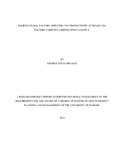| dc.description.abstract | The study was conducted at Iriaini Tea Factory Co. Ltd catchment area located in Nyeri County in Kenya. The over 6000 small holder Tea Farmers are served by the Factory and they also own the Tea Factory through share holding and by virtue of their delivery of green leaf tea to the factory for processing. Majority of the tea Farmers rely on tea earnings for their livelihood. Tea productivity for Iriaini Tea Factrory farmers in the financial year 2012/2013 was 2883kgs made tea per hectare which is below the potential of above 5000kg made tea per hectare per year. The study followed descriptive survey method. A sample of 302 out of the designed sample of 305 was achieved. The majority of the respondents were male. Tea productivity of farms owned by the young and old farmers was lower than that owned by the others age bracket. Dependents of the Farmers did not affect tea productivity with an average of 3 dependents for every farmer. Majority of the respondents had 1000 tea bushes having a productivity of 2883Kg of green leaf tea per hectare. The more the number of tea bushes a farmer owned the less the tea productivity, this could have been as a result of labor constraints where the farmers rely mostly on hired labor which could be erratic in duty attendance. The average income from tea was found to be below the minimum wage as prescribed by the Kenya Government. The respondents who had other
income sources got better tea productivity from their farms. The Management skills of the Respondents was viewed as fair, with the farmers who kept records on tea plucked in an year having a higher tea productivity. Majority of the respondents do not hold title deed for the tea farm with a small number who lease farms. This could be a potential threat for improving of the productivity and continuation of the tea business. The respondents contact with the Tea Extension Services Assistant was not adequate, and this been the major source of advice to the respondents, then could have negative effects on the tea productivity. The researcher felt that the number of
Tea Extension Services Assistants was not adequate to cater for the training needs of the large number of the farmers in the catchment. The research findings aimed at providing policy makers with information on the socio cultural factors affecting tea productivity with an aim of removing the obstacles to improved productivity and hence improved income. The farmers will be informed on what hinders their performance and where possible the farmers may undergo training. The Factory Management will be provided with the findings of this study in a view to improving on the services that they offer the farmers. | |

